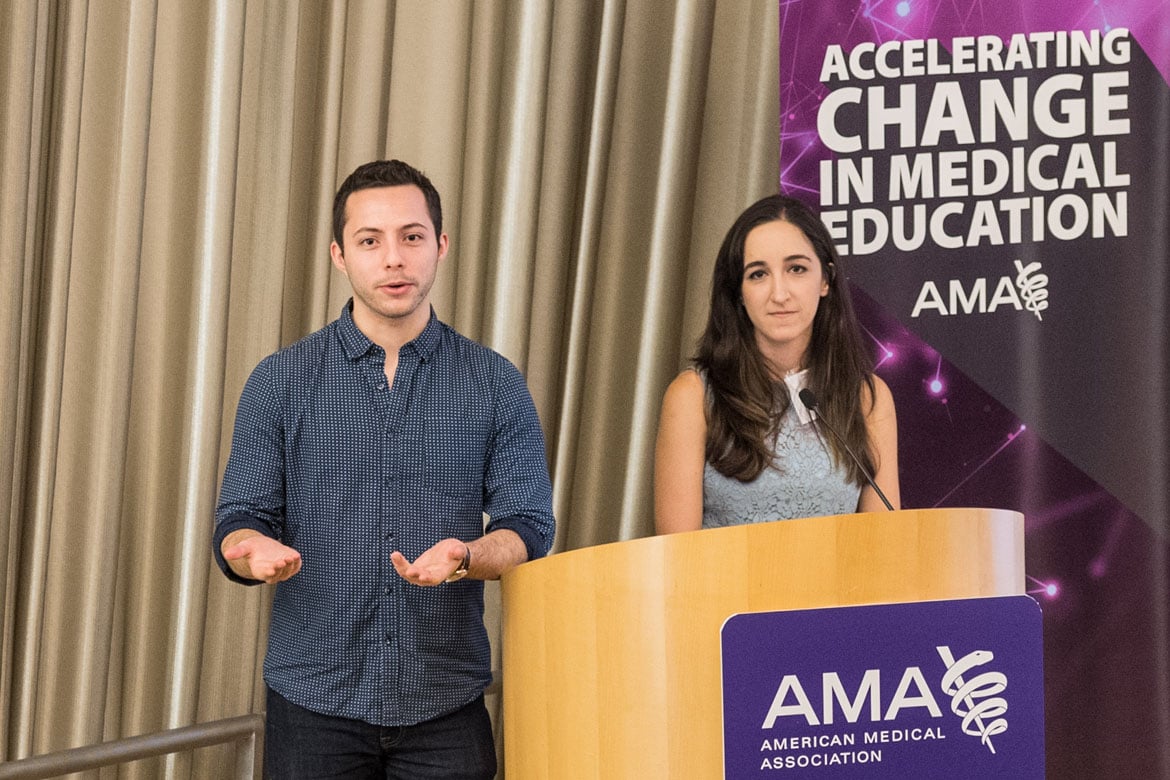To keep up with changes in medicine—changes medical school curriculum struggles to reflect—a group of students at the Mayo Clinic School of Medicine is forming connections with private companies to learn about entrepreneurialism and the cutting edge in health care innovation.
Editt Nikoyan and Elias Saba, students at Mayo Clinic who are members of the Entrepreneurship in Medicine (EIM) Interest Group, showcased its activities during a presentation at the Accelerating Change in Medical Education Student-Led Conference on Leadership at the University of Michigan.
“We believe that while a curriculum is very important, and this is a very integral part of the experience, the curriculum is uniform,” Saba said. “It’s slow to change. It’s not very reactive to the times. And that’s why an interest group or an organization run by students, led by students, that can respond to those changes is really important.”
Companies love med students
EIM emphasizes that medical students should be exposed to a variety of interdisciplinary fields—such as business, engineering, technology and leadership—that are impactful in the health care space. To allow medical students to gain a better understanding of what is happening outside of the clinic and the classroom, they need to leave that setting. EIM acts as a liaison between Mayo students and the business community in Rochester, Minnesota.
To emphasize the importance of interdisciplinary learning, EIM has worked with Rochester businesses on activities that bring members of the interest group to their offices to further their knowledge base. The outings have mostly taken place at startup companies. One example is Limb Lab, a local prosthetics company.
“You don’t have to have a background in engineering or technology or anything like that,” Nikoyan said. “The whole point of this interest group is to show medical students we can still be involved in those conversations. We can still innovate with our background. And the diversity we have coming into med school is still a great asset to being an inventor or coming up with ideas and bringing those ideas to life.”
EIM members have found the Rochester business community to be enthusiastic about collaborating with their group.
“We’ve been surprised by how open companies are,” Saba said. “They love medical students and they want us to get involved in engineering and technology. I think that would be the case all over the country.”
Solving problems across fields
The interest group was a pilot program during the 2016 school year, operating with no specific funding or administrative guidance. EIM is working on expanding its scope in the year ahead.
The interest group is creating a selective in which a team of students will identify a problem in medicine then pitch a solution to that problem. The selective is through a partnership with Sling Health, which brings together multidisciplinary student teams and collaborates with the AMA. To launch the selective, the Mayo EIM program will extend to Mayo’s Scottsdale inaugural class, where medical students will work in tandem with students studying business and engineering at Arizona State University.
“Our organization is very interdisciplinary,” Saba said. “It encompasses technology, business administration, people who are leaders both in the clinical realm and the innovation realm. We talk about how do you balance that clinical practice and your desire to reach beyond? Most people go to medical school for clinical practice, as do we. But we do want to make [entrepreneurship] something that people consider in a future career.”
The Mayo Clinic students’ presentation was among dozens of presentations and speeches that took place during the student-led conference. Co-hosted by the University of Michigan Medical School and the AMA, the theme of the conference was “learn, connect, empower, impact.”




